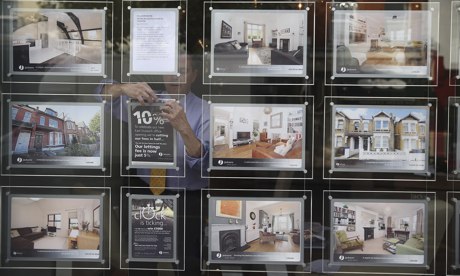London house prices linked to political uncertainty overseas
01-14-2014
Study finds that turmoil in certain countries 'directly correlates' with strong price rises in their related London areas

Phillip Inman, economics correspondent
Homes for sale advertised at an estate agents
Homes for sale advertised at an estate agents. In London areas with a higher share of residents originating from a particular country, house prices were nearly 0.5% higher in months following a rise in uncertainty. Photograph: Dan Kitwood/Getty Images
House price rises in parts of London can be directly linked to political turmoil in far-flung countries as rich foreign buyers look for a safe haven for their cash, according to a study by the University of Oxford.
For more than 20 years London property values have benefited from events abroad, especially in areas of the capital already popular with wealthy immigrant communities, the study by two academics at the university's Saïd Business School found.
Chinese, Middle Eastern and Russian buyers, who dominated before 2008, have competed with Italians, Spaniards and Greeks in recent years as wealthy southern Europeans hit by the financial crash bought safe assets.
The study showed that house price rises in London could be attributed – at least in part – to the influx of foreign buyers, separately from other factors including low interest rates and the government's Help to Buy scheme to boost the market.
House price rises of around 8% last year, according to the latest figures from lenders the Halifax and Nationwide, were largely driven by rises in the south-east and the study is likely to fuel anger among ordinary buyers who are increasingly priced out of the market.
There is a direct correlation between house price changes in particular areas of London and economic and political risks in different parts of the world, according to academics Tarun Ramadorai and Cristian Badarinza.
They said: "This goes a long way towards explaining why London house prices have continued to rise at a disproportionate rate compared with those in the rest of the country, and can also shed light on the well-known fact that capital flows appear to flow 'uphill' from relatively poor to relatively rich countries."
On average, in London areas with a higher share of residents originating from a particular country, house prices were nearly 0.5% higher in months following an increase in that country's annually-measured political uncertainty.
Ramadorai said they sub-divided London into electoral wards and linked each London area with a specific foreign country. The research found that increases in political and economic uncertainty in certain countries was closely associated with strong price rises in their linked London areas.
Ramadorai said: "The seeming invulnerability of London's property market has long been assumed to be a result of its status as a 'safe haven' – an investment location in which assets will retain or even increase their value in the face of turbulence in other parts of the world.
"However, this perception has not been backed up with rigorous, empirical research on the issue. The granular level at which we have analysed the data allows us to confirm that safe haven demand effects from southern Europe, China, the Middle East, Russia, and south Asia are indeed important factors in explaining the dynamics of London house prices."
The researchers traced millions of house price transactions to identify the effect over the past decade and a half, using information from the Land Registry, the Office of National Statistics, and the Nationwide building society, as well as data on international economic and political uncertainty from a number of sources.

